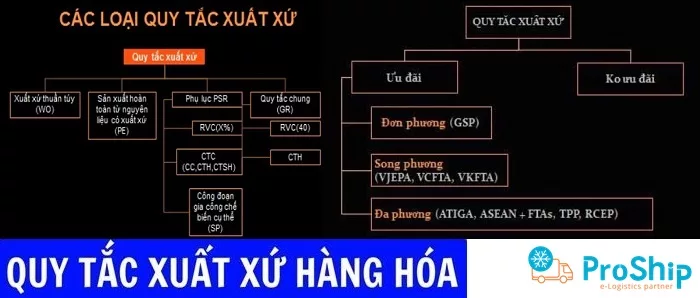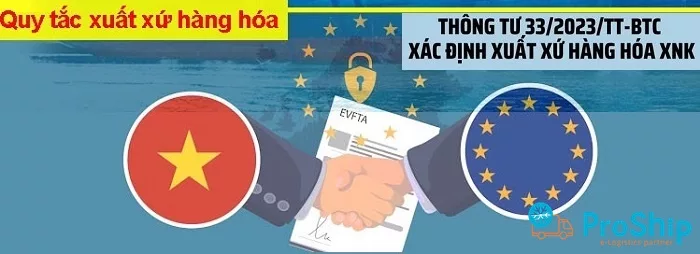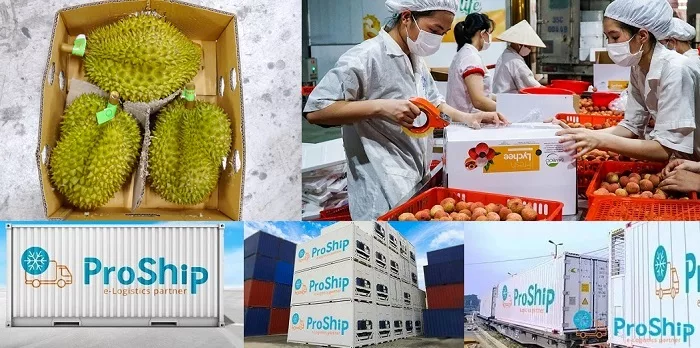x DN kinh doanh hàng xuất, nhập cần tìm hiểu các kiến thức liên quan tới quy tắc xuất xứ?
x Bạn thắc mắc vai trò, quy định, cơ sở pháp lý của quy tắc xuất xứ hàng hóa là gì?
x Bạn quan tâm tới DV xuất khẩu Vải, Sầu riêng sang Trung Quốc qua Ga Đồng Đăng của Proship?
Proship.vn dựa trên kinh nghiệm cùng sự hiểu biết về nghiệp vụ hải quan sẽ giải đáp thắc mắc liên quan tới quy tắc xuất xứ hàng hóa, bao gồm khái niệm, vai trò, cơ sở pháp lý, quy định,…Các DN, Đơn vị chuyên kinh doanh hàng xuất/hàng nhập có thể dựa vào đây để áp dụng cho lô hàng của mình nhằm tránh trường hợp bị giữ hàng lại do thiếu hoặc vướng mắc giấy tờ, hồ sơ liên quan đến nguồn gốc, xuất xứ hàng.
Đồng thời, Proship Logistics cũng mong muốn đem đến cho khách hàng nhiều ưu đãi đặc biệt khi sử dụng Dịch vụ xuất khẩu Sầu riêng, Vải thiều sang Trung Quốc Chính Ngạch giá rẻ, bao trọn gói thủ tục, đóng thuế 2 đầu cho DN. Tin chắc quý khách sẽ hài lòng với chi phí bỏ ra và giá trị, hiệu quả nhận lại từ dịch vụ.
📦 Hotline Liên Hệ Vận Chuyển
🧭 Miền Trung
XEM THÊM: Dịch vụ vận chuyển Container Bắc Nam của Proship
Quy tắc xuất xứ hàng hóa là gì? Có mấy loại quy tắc?
Thế nào là quy tắc xuất xứ hàng hóa?
Trong thủ tục xuất nhập khẩu hàng hóa, chúng ta vẫn thường nhắc đến Danh từ “xuất xứ hàng hóa”. Xuất xứ hàng hóa (từ Tiếng Anh “Certificate of Origin”, viết tắt là CO). Xuất xứ hàng hóa thường gắn liền với quốc tịch (sinh ra/sản xuất tại đâu, đến từ quốc gia nào?). Thông qua xuất xứ hàng hóa, Doanh nghiệp, Người tiêu dùng hay Cơ quan quản lý Nhà nước có thể dễ dàng nắm rõ được nguồn gốc xuất xứ của loại hàng hóa đó đến từ đâu.
Vậy, quy tắc xuất xứ là gì? Quy tắc xuất xứ hàng hóa là quy định về xuất xứ áp dụng cho hàng hóa có thỏa thuận ưu đãi về thuế quan và ưu đãi phi thuế quan. Các Hiệp định thương mại tự do khác nhau sẽ có quy định về nguồn gốc xuất xứ khác nhau.

Có mấy loại quy tắc xuất xứ hàng hóa?
Quy tắc xuất xứ của hàng hóa được chia làm hai loại theo quy định tại Điều 3 Nghị định số 31/2018/NĐ-CP, gồm:
- Quy tắc xuất xứ ưu đãi: Là các quy định về xuất xứ áp dụng cho hàng hóa có cam kết hoặc thỏa thuận ưu đãi về thuế quan và ưu đãi về phi thuế quan.
- Quy tắc xuất xứ không ưu đãi: Là các quy định về xuất xứ áp dụng cho hàng hóa không có cam kết hoặc thoả thuận ưu đãi về thuế quan và ưu đãi về phi thuế quan. Trong trường hợp áp dụng các biện pháp thương mại không ưu đãi về đối xử tối huệ quốc, chống bán phá giá, chống trợ cấp, tự vệ, hạn chế số lượng hay hạn ngạch thuế quan, mua sắm Chính phủ và thống kê thương mại.
>>Xem thêm: Xuất nhập khẩu tại chỗ là gì?
Vai trò, cơ sở pháp lý và quy định liên quan tới quy tắc xuất xứ hàng hóa
Sau khi đã giải đáp quy tắc xuất xứ là gì, quy tắc xuất xứ hàng hóa gồm mấy loại, Proship sẽ tiếp tục dẫn chứng về cơ sở pháp lý của quy tắc xuất xứ, các quy định liên quan cũng như vai trò của quy tắc xuất xứ sản phẩm hàng hóa. Cụ thể như sau:
Vai trò của quy tắc xuất xứ hàng hóa
Quy tắc xuất xứ của hàng hóa áp dụng cho hàng nhập khẩu nhằm mục đích sau:
- Thực thi các biện pháp hoặc công cụ thương mại, như thuế chống bán phá giá, biện pháp tự vệ…;
- Xác định hàng hóa nhập khẩu thuộc diện được hưởng ưu đãi thương mại;
- Phục vụ việc thực thi các quy định pháp luật về nhãn và ghi nhãn hàng hóa;
- Phục vụ các hoạt động mua sắm của chính phủ theo quy định;
- Phục vụ công tác thống kê thương mại.
Quy tắc xuất xứ nhằm xác định sự hợp lệ của hàng nhập khẩu để được hưởng mức thuế ưu đãi. Nếu không có quy tắc xuất xứ, hiện tượng thương mại chệch hướng (trade deflection) sẽ rất khó ngăn chặn. Hàng hóa nhập khẩu từ các nước không tham gia FTA sẽ vào khu vực FTA thông qua nước thành viên. Từ đó, mức thuế thấp nhất sẽ được áp dụng với hàng hóa nhập khẩu từ các nước không tham gia FTA.
Quy tắc xuất xứ không chỉ là công cụ kỹ thuật để thực thi FTA mà còn là một công cụ Chính sách thương mại. Tuy nhiên, điều này có thể làm tăng chi phí mà các Doanh nghiệp phải chịu dưới hình thức giấy tờ và chi phí kế toán.
Cơ sở pháp lý về quy tắc xuất xứ hàng hóa
Quy tắc xuất xứ của hàng hóa dựa trên những cơ sở pháp lý sau:
- Hiệp định về quy tắc xuất xứ hàng hóa của WTO;
- Nghị định số 19/2006/NĐ-CP ngày 20/02/2006 quy định chi tiết Luật thương mại về xuất xứ hàng hóa;
- Thông tư số 08/2006/TT-BTM ngày 17/4/2006 và Thông tư số 10/2006/TTBTM ngày 01/6/2006 của Bộ Thương mại hướng dẫn cách xác định xuất xứ không thuần túy;
- Thông tư số 06/2011/TT-BCT ngày 21/3/2011 của Bộ Công thương quy định thủ tục cấp C/O hàng hóa ưu đãi;
- Quyết định 1313/QĐ-BCT ngày 17/4/2017 về việc sửa đổi, bổ sung Quyết định số 2412/QĐ-BCT ngày 15 tháng 6 năm 2016 của Bộ trưởng Bộ Công Thương ban hành Quy trình cấp Giấy chứng nhận xuất xứ hàng hóa ưu đãi qua Internet;
- Thông tư 31/2018/NĐ-CP ngày 08/3/2018 Quy định chi tiết Luật Quản lý ngoại thương về xuất xứ hàng hóa;
- Thông tư 05/2018/TT-BCT ngày 03/4/2018 Quy định về xuất xứ hàng hóa;
- Thông tư 15/2018/TT-BCT ngày 29/6/2018 Quy định về việc phân luồng trong quy trình Cấp giấy chứng nhận xuất xứ hàng hóa ưu đãi;
- Thông tư 39/2018/TT-BCT ngày 30/10/2018 Quy định kiểm tra, xác minh xuất xứ hàng hóa xuất khẩu.

Quy định chung của quy tắc xuất xứ hàng hóa
Quy định về cấp giấy chứng nhận nguồn gốc hàng hóa
Điều 12 Chương 4 Nghị định số 19/2006/NĐ-CP ngày 20 tháng 02 năm 2006 của Chính phủ, Quy định về xuất xứ hàng hóa:
- Giấy chứng nhận xuất xứ do các tổ chức cấp Giấy chứng nhận xuất xứ cấp theo mẫu quy định;
- Người đề nghị cấp Giấy chứng nhận xuất xứ của hàng hoá xuất khẩu phải nộp cho tổ chức cấp Giấy chứng nhận xuất xứ bộ hồ sơ đề nghị cấp Giấy chứng nhận xuất xứ của hàng hóa và chịu trách nhiệm trước pháp luật về tính xác thực nội dung hồ sơ đó;
- Tổ chức cấp Giấy chứng nhận xuất xứ tiến hành kiểm tra bộ hồ sơ, để xác định nguồn gốc hàng hoá xuất khẩu và cấp Giấy chứng nhận xuất xứ trong thời gian không quá 03 ngày làm việc, có thể kéo dài nhưng không quá 05 ngày làm việc;
- Giấy chứng nhận xuất xứ sẽ không được cấp nếu hàng hoá xuất khẩu không đáp ứng được tiêu chí về xuất xứ quy định tại Nghị định này hoặc bộ hồ sơ đề nghị cấp không hợp lệ;
- Trong trường hợp cơ quan Hải quan, cơ quan có thẩm quyền của quốc gia, vùng lãnh thổ nhập khẩu hàng hoá của Việt Nam hoặc cơ quan có thẩm quyền của Việt Nam yêu cầu kiểm tra tính xác thực xuất xứ của hàng hoá trong quá trình vận chuyển, Tổ chức cấp Giấy chứng nhận xuất xứ có trách nhiệm xác minh xuất xứ của hàng hoá này và thông báo lại cho cơ quan đã yêu cầu.
Quy tắc hàng hóa không ưu đãi
Điều 6 Thông tư 05/2018/TT-BCT do Bộ Công Thương ban hành, nêu rõ quy tắc nguồn gốc hàng hóa không ưu đãi như sau:
- Hàng hóa xuất khẩu, hàng hóa nhập khẩu được coi là có xuất xứ thuần túy hoặc được sản xuất toàn bộ tại một nước, nhóm nước, hoặc vùng lãnh thổ nếu đáp ứng quy định tại Điều 7 Nghị định số 31/2018/NĐ-CP ngày 08/03/2018 của Chính phủ quy định chi tiết Luật Quản lý ngoại thương về xuất xứ của hàng hóa (gọi tắt là Nghị định số 31/2018/NĐ-CP);
- Hàng hóa xuất khẩu, hàng hóa nhập khẩu được coi là có xuất xứ không thuần túy hoặc không được sản xuất toàn bộ tại một nước, nhóm nước, hoặc vùng lãnh thổ nếu đáp ứng tiêu chí xuất xứ không ưu đãi thuộc Danh Mục Quy tắc cụ thể mặt hàng quy định tại Phụ lục I ban hành kèm theo Thông tư này để hướng dẫn Điều 8 Nghị định số 31/2018/NĐ-CP.
Quy tắc nguồn gốc hàng hóa ưu đãi
Điều 5 Thông tư 05/2018/TT-BCT do Bộ Công Thương ban hành, nêu rõ quy tắc xuất xứ ưu đãi như sau:
- Đối với hàng hóa xuất khẩu, hàng hóa nhập khẩu thuộc diện được hưởng chế độ ưu đãi thuế quan và phi thuế quan, quy tắc xuất xứ ưu đãi được thực hiện theo Điều ước quốc tế mà Việt Nam ký kết hoặc gia nhập và theo quy định của Bộ Công Thương hướng dẫn Điều ước quốc tế đó;
- Đối với hàng hóa xuất khẩu thuộc diện được hưởng chế độ ưu đãi thuế quan phổ cập và các ưu đãi đơn phương khác, quy tắc xuất xứ ưu đãi được thực hiện theo quy định của nước nhập khẩu dành cho các ưu đãi này và theo quy định của Bộ Công Thương hướng dẫn quy tắc xuất xứ đó.
Cách ghi nguồn gốc hàng hóa trên nhãn mác
Điều 15 Nghị định 43/2017/NĐ-CP quy định cách ghi nguồn gốc của hàng hóa trên nhãn hàng hóa như sau:
- Tổ chức, cá nhân sản xuất, nhập khẩu tự xác định và ghi xuất xứ đối với hàng hóa của mình nhưng phải bảo đảm trung thực, chính xác, tuân thủ các quy định của pháp luật về xuất xứ của hàng hóa hoặc các Hiệp định mà Việt Nam đã tham gia hoặc ký kết;
- Cách ghi xuất xứ hàng hóa: Ghi cụm từ “sản xuất tại” hoặc “chế tạo tại”, “nước sản xuất”, “xuất xứ” hoặc “sản xuất bởi” kèm tên nước hoặc vùng lãnh thổ sản xuất ra hàng hóa đó;
- Tên nước hoặc vùng lãnh thổ sản xuất ra hàng hóa đó không được viết tắt.
📦 Hotline Liên Hệ Vận Chuyển
🧭 Miền Trung
NÊN ĐỌC: Nhận vận chuyển Container Lạnh giá rẻ
Proship Logistics hân hạnh giới thiệu Dịch vụ xuất khẩu Sầu riêng, Vải thiều sang Trung Quốc Chính Ngạch qua Ga Đồng Đăng Lạng Sơn bao trọn gói thủ tục, đóng thuế 2 đầu cho Doanh nghiệp
Công ty Cổ phần Proship hân hạnh giới thiệu tới Quý khách hàng Dịch vụ xuất khẩu sầu riêng, vải thiều bằng container lạnh tự hành đường sắt sang Trung Quốc qua Ga Đồng Đăng Lạng Sơn bao trọn gói thủ tục, hỗ trợ đóng thuế 2 đầu cho DN. Theo đó, Proship Logistics sẽ thực hiện quá trình vận tải, xuất khẩu theo cách thức như sau:
- Trước tiên, điều container lạnh chuyên dụng tới kho của Doanh nghiệp để đóng hàng;
- Kế đến là tiến hành vận chuyển hàng về Ga Kép Bắc Giang và thực hiện khai báo hải quan;
- Tiếp theo là vận chuyển container lạnh lên Cửa khẩu Đồng Đăng Lạng Sơn và hoàn thành quá trình hải quan giám sát;
- Vận chuyển sầu riêng, vải thiều bằng container lạnh đến Ga Bằng Tường (Proship có thuê kho tại Ga Bằng Tường) và đi sâu vào Nội địa Trung Quốc.
Đối với quy tắc xuất xứ, nguồn gốc hàng hóa, phía Proship nắm rất rõ và hiểu luật nên cam kết chuẩn bị đủ hồ sơ xuất khẩu cần thiết cho lô hàng Vải thiều, Sầu riêng của khách. Nhà vườn, Doanh nghiệp, Chủ hàng có nhu cầu gửi và xuất khẩu số lượng lớn 2 loại trái cây này sang thị trường Trung Quốc chỉ việc tới kho Proship để gửi hàng, việc còn lại chúng tôi sẽ thay bạn hoàn tất từ A-Z mọi thủ tục với phía hải quan.
Đặc biệt, Proship đang ứng dụng giải pháp vận chuyển giảm 25 – 30% chi phí Logistics trong chuỗi cung ứng lạnh của DN, vừa tiết kiệm vừa mang lại hiệu quả cao trong giao thương, xuất khẩu trái cây Việt sang nước bạn. Chọn phương thức vận tải đường sắt sẽ có Cửa khẩu thông quan riêng vừa nhanh chóng vừa tránh ùn tắc làm chậm trễ tiến độ giao thương. Cho nên thay vì chọn đường bộ, Proship Logistics khuyến khích DN nên ưu tiên lựa chọn giải pháp xuất khẩu nông sản, trái cây bằng đường sắt.

Lịch trình vận tải container lạnh tuyến Việt – Trung
Tuyến Việt Nam – Trung Quốc: Khởi hành hằng ngày
- Tuyến Yên Viên – Đồng Đăng – Pingxiang – Nanning Nan sau đó tiếp chuyển đi các tỉnh, thành Trung Quốc (và ngược lại);
- Vận chuyển hàng hóa Liên vận Quốc tế trên tuyến Kép – Đồng Đăng – Bằng Tường – Nam Ninh và ngược lại: 2 chuyến/ngày;
- Thời gian: 3 ngày (không bao gồm thời gian làm thủ tục tại các ga biên giới;
- Dịch vụ vận chuyển hàng hóa khép kín Kho – Kho.
Các loại Vải, Sầu riêng nhận XK, vận tải bằng cont lạnh tự hành đường sắt
Nhận xuất khẩu nhiều loại Sầu riêng sang TQ qua Ga Đồng Đăng
Proship nhận XK Sầu riêng sang Trung Quốc đa dạng các loại:
- Sầu riêng Ri 6;
- Sầu riêng khổ qua;
- Sầu riêng chuồng bò;
- Sầu riêng ruột đỏ;
- Sầu riêng Cái Mơn;
- Sầu riêng thái (sầu riêng Dona),…
Nhận xuất khẩu nhiều loại Vải thiều sang TQ qua Ga Đồng Đăng
Proship nhận XK Vải thiều sang Trung Quốc đa dạng các loại:
- Vải thiều Bát Trang (Hải Phòng);
- Vải thiều Lục Ngạn (Bắc Giang);
- Vải thiều Thanh Hà (Hải Dương),…
Hồ sơ hải quan và đăng ký mã vùng cho sầu riêng, vải xuất khẩu
Bộ hồ sơ Proship dự kiến chuẩn bị cho lô hàng sầu riêng, vải xuất khẩu
- Hợp đồng thương mại (Sales Contract);
- Hóa đơn thương mại (Commercial Invoice);
- Phiếu đóng gói hàng hóa (Packing list);
- Vận đơn (Bill of Lading);
- Tờ khai Hải quan (Customs Declaration);
- Chứng từ bảo hiểm (Insurance Certificate);
- Giấy chứng nhận nguồn gốc xuất xứ hàng hóa (C/O Form E) – Đáp ứng đúng quy tắc xuất xứ hàng hóa;
- Giấy chứng nhận kiểm dịch (Phytosanitary Certificate);
- Các giấy tờ khác theo yêu cầu của hải quan và phục vụ cho việc xin giấy phép như: Catalogue, hình ảnh hàng,…
Hồ sơ đăng kí mã vùng trồng cho sầu riêng, vải xuất khẩu
- Đơn xin cấp mã số vùng trồng;
- Giấy đăng ký kinh doanh;
- Các giấy tờ chứng minh quyền sử dụng đất;
- Giấy chứng nhận VietGAP cho vùng trồng xin cấp mã số (nếu có);
- Tờ khai kĩ thuật (TCCS 772: 2020/BVTV).
Trên đây là những kiến thức về quy tắc xuất xứ, Quý DN kinh doanh hàng xuất, hàng nhập đã có giải đáp chuẩn xác quy tắc xuất xứ là gì, quy tắc xuất xứ hàng hóa có vai trò gì, quy định thế nào. Từ đây, Doanh nghiệp cũng có cơ sở chuẩn bị đủ hồ sơ, chứng từ quan trọng cho lô hàng xuất/nhập của đơn vị mình giúp quá trình làm việc với phía hải quan diễn ra suôn sẻ và thuận lợi…Để được cung cấp trọn gói Dịch vụ xuất khẩu Sầu riêng, Vải thiều sang Trung Quốc Chính Ngạch bao trọn gói thủ tục giá rẻ, quý khách vui lòng liên hệ 0909 344 247.
📦 Hotline Liên Hệ Vận Chuyển
🧭 Miền Trung

